Papa Vinyard here, now here's a little somethin' for ya...
This column will tackle an Oscar winner from each year starting with the inception of the Academy Awards in 1929. My goal is to highlight lesser-known films from throughout cinema history that were able pull down one (or more) of the Golden Statuettes that remain such an integral part of Hollywood lore. I will also take a close look at the actual element(s) that the film was given awards for, with my analysis on how they hold up with years (or decades) of cinematic history in the rearview since. This week, the topic of discussion is the 2009 winner for Best Foreign Language Film, DEPARTURES. Check back next Sunday for a look at the 1934 winner for "Outstanding Production" (Best Picture), Best Director, and Best Art Direction, Frank Lloyd's CAVALCADE.

If you ask me, there are two primary qualifications for a film to nab the Best Foreign Language Oscar (aside from, you know, being a foreign film). First, it has to be a damn good movie. They're highlighting the best film of the countless works that come outside of the U.S. The amount of output the voters have to rifle through is astounding, so whatever rises to the cream of the crop is typically something that is (hopefully) the strongest, most memorable, or most inventive flick that required you to read subtitles that year. Ideally, this would be the lone qualifying factor.
Another element that can get a foreign film Oscar attention is how educational it is in regards to what life is like in its country of origin. Think about how A SEPARATION gave us a look at marriage and divorce in conservative Muslim Iran, or TSOTSI's insight into life in the slums of Johannesburg. It's a natural feeling to watch a film and become fascinated by the unknown worlds it gives a glimpse into, particularly if you are convinced that what you're seeing is the way things really are in some part of the world. You could even argue that that feeling is what locked SLUMDOG MILLIONAIRE, with its look at the poorest, most helpless citizens of Mumbai, its Best Picture win against the bigger, more "Hollywood" THE CURIOUS CASE OF BENJAMIN BUTTON (I like the movie, but you certainly don't hear its name bounded around pop culture 5 years later the way you do BUTTON).
The same year SLUMDOG beat BENJAMIN BUTTON for Best Picture, Yojiro Takita's DEPARTURES beat four highly acclaimed works, and took home the award for Best Foreign Language Film. I'd never heard anything about the film, so when I sat down with it, I was hoping it would at least satisfy that first qualification, if not both. Unfortunately, I found that it seemed to be the latter, rather than the former, that scored the film Oscar gold back in '09.
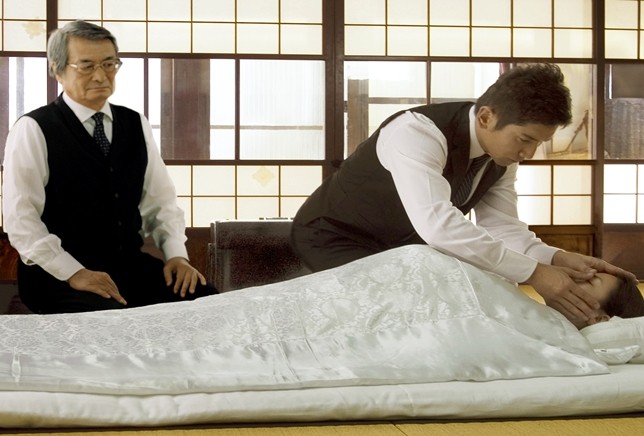
"When I was a child, winter didn't feel so cold. It's nearly two months since I've moved home from Tokyo. It's been an awkward time."
-Opening narration of DEPARTURES
We open on an "encoffinment". Two men, an older gent and his young protege, ritualistically prepare a young woman for burial as her friends and family watch in silence. The old man quietly confides in his assistant that the girl must've died from "suicide by charcoal," due to how healthy and well-preserved her corpse is. The younger fellow heads up the process, ensuring that the body's hair, makeup, and clothing are carefully and appropriately arranged for her burial. As he's cleaning the body, he feels something underneath her gown. "She's got one," he mutters to his boss. "Got what?" he asks. "A thing." He feels for himself. This girl's packing. He asks the family if they'd like her buried as a man or a woman; they agree to send her off as she would've liked, as a woman.
After this intro, we flash back to when the young man, named Daigo, was a cellist in a Toyko orchestra. He has a passion for it, but when the orchestra is shut down due to lack of funds, he and his wife decide to move out of the city and back to his hometown of Sakata. His father left when he was a boy, his mother has passed on, he doesn't really have any friends in the area, and on top of all that, he's hard up for work. He finds a listing in the classifieds looking for an "NK Agent". The job allegedly has lenient working hours and a good starting salary, and requires no prior experience. The only details are that the applicant would be "working with departures." Daigo assumes the job is with a travel agency or something.
When Daigo shows up to interview for the gig, he struggles to deduce what the job entails, even when he meets his prospective boss. "Will you work hard?" he asks the young man without even glancing at his resume. "Yes." "You're hired." He is dumbstruck when he's told what the job entails, and chickens out of telling his wife his new occupation. To make matters even more uncomfortable for Daigo, his first day on the job requires him not to help his boss, Ikuei, with an actual encoffinment, but to act as a model corpse for a "how to" DVD to help others in the trade. Later, on his first real assignment, he gets nauseous and pukes when he discovers that the body he and Ikuei are responsible for has been deteriorating for weeks. On top of that, the smell lingers on his person, causing him much embarrassment on the bus ride home.
Time goes on, and despite a few other somewhat embarrassing encounters, Daigo comfortably settles into his occupation. He becomes good friends with Ikuei and his co-worker, Yuriko, reconnects with a former buddy and his mother, who now owns a local bathhouse, and even picks up the cello again. However, when his wife finds the instructional DVD with Daigo acting as the corpse (featuring a close-up of him wincing as Ikuei shoves a cleaning cloth into his anus), she puts two and two together, and is super grossed-out at her discovery. She is physically revolted by what he does, telling him, "Don't touch me! You're unclean!", and leaves for Tokyo. He becomes even more comfortable and intimate with his work family when his wife comes back, two months later, announcing that she's pregnant. All seems to be well before several people close to Daigo start dying off, forcing him to perform some deeply emotional encoffinments, and to move past his issues with his own father that have plagued him since childhood.
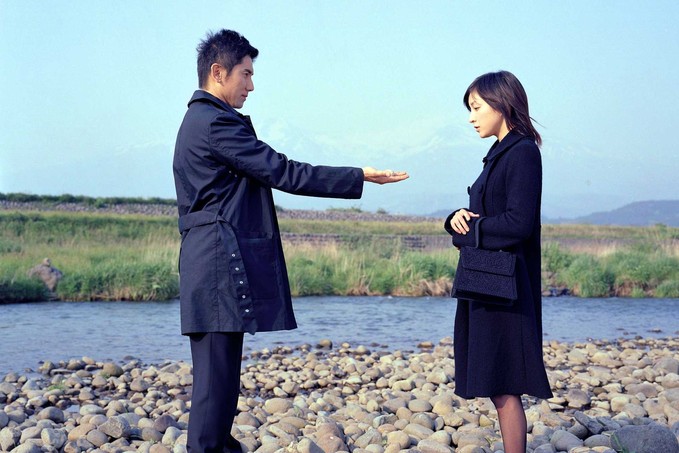
I guess I jinxed it. On my last Oscar Sunday write-up, I proclaimed 1931's BAD GIRL as the only movie I've disliked, as a whole, thus far while doing this column. This one is the second. Perhaps it is my addled millennial attention span, or just that I could not connect with the film's notions of happiness and overcoming familial wrongdoings, but this movie failed to score with me. It's overlong, soggy, tonally incongruous, and worst of all, friggin' boooooring. The movie is like 20 minutes of set up, and an hour-40 of emotional payoffs. At some point, about an hour in, I really couldn't care less.
Not to say I hated the movie, merely that I didn't care for it. Some aspects of the film came off better than others. The deadpan sense of humor throughout the movie actually worked for me, starting from that opening scene of Daigo and Ikuei realizing that their subject is a transvestite mid-ceremony. In general, Tsutomo Yamazaki's portrayal of Ikuei Sasaki is subtle, dry, and consistently quite funny. The job has soured him up a tad, and he's no longer affected by things like death, the smell of rotting corpses, or the noticeable discomfort of a grieving family. He's just there to perform his duty and get paid. A scene where he remembers doing the encoffinment for his own wife somehow dodges the trap of tawdry self-indulgement, and becomes a sweetly sad encompassment of who this guy is. Yamazaki, a screen veteran of 50+ years who worked with Kurosawa (on HIGH AND LOW, RED BEARD, and KAGEMUSHA), cuts a memorable figure out of what could've easily been a laughable "grumpy mentor" role, and is the only cast member who successfully avoids being compromised by the superfluous narrative trappings of the film.
But Yamazaki's Ikuei, and the film's humor in general, seem to be at odds with the rest of the film. Masahiro Motoki's Daigo is at the mercy of the film's tonal shifting. In some scenes, particularly his first few scenes after getting hired, Motoki is almost slapsticky in his discomfort, mugging his way through the instructional DVD, puking like a Nickelodeon character when encountering a body, and goofily washing himself in the bathhouse like TOMMY BOY after cowtipping. When the film becomes about Daigo finding peace with his new life and new profession, Daigo is rendered into a placid, calmly confident pro, which would be fine at the film's end. Watching him as that character for the second hour of the film is like watching paint dry.
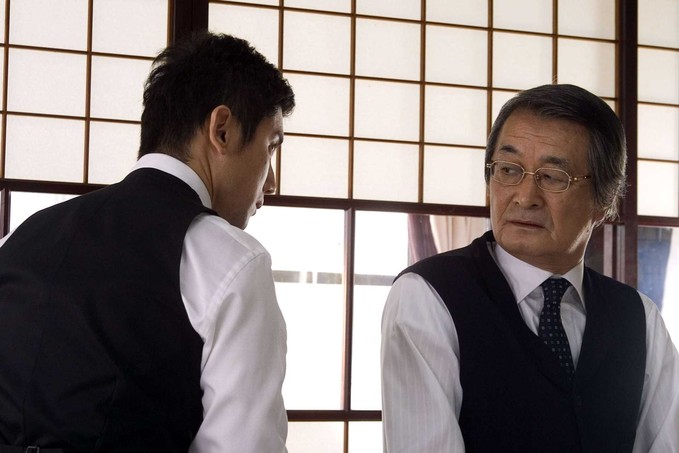
In general, Daigo's arc (if you could even call it that), aside from being almost fully achieved by the halfway point, is thin and arbitrary. In the beginning, he is a cellist who is uncertain about fatherhood or his future. By the end, he is an NK agent who likes his new job and eagerly awaits the birth of his child. Seen it before, and wasn't all too keen on it those other times, either. Maybe if the tone of the film didn't straddle so uncomfortably between pronounced comedy and drawn-out melodrama, there would be more of a place for Daigo's journey in the film. But as is, he becomes almost invisible in the second half of the picture, and Motoki's performance devolves into a lot of posturing and poised monologuing.
Aside from Ikuei, the supporting characters are all cyphers at the mercy of the narrative. Ryoko Hirosue, as Daigo's wife, Mika, paints the picture of a giggly, unrelentingly supportive wife right up until the moment her character is supposed to turn on him. Then, for a scene, she goes into crazy mode as she shudders and screams at the thought of Daigo touching dead bodies for a living. But I guess pregnancy does crazy things to a woman's emotional responses, 'cause once she comes back to Daigo, she's back to her own cartoon-character self, all smiles and optimism. Not only does it make that whole stretch of the film where she leaves seem like padding, but it makes Hirosue look like a clown (or even worse, a soap opera actress), asked to portray emotions in the broadest strokes depending on what the individual scene calls for. It fits in with the crucial flaw of the rest of the movie, its teetering from "sad" to "funny" like the worst anime you've ever seen.
Kimiko Yo, as Daigo's co-worker, Yuriko, has somewhat of a dignified presence because her character is never played for laughs, but it's still not balanced. Her character is firmly in the melodrama camp. The early, comic interview scene gets a weird overtone because of her presence in the room. We're laughing at Ikuei because he is so nonchalant about hiring Daigo, and we're also chuckling at how befuddled and clueless Daigo is about what he's interviewing for, but Yuriko? She's standing around looking as sad as, well, a normal, emotional woman who has to deal with dead bodies for a living. By the time *SPOILER ALERT* she's begging Daigo to personally handle his deadbeat father's burial as a way for her to get over abandoning her own child *END SPOILER*, the film has nestled comfortably into dramatic territory, and her character's finally allowed to breath. Yuriko's on the other side of Ikuei, a character that belongs wholly in the dramatic scenes of the film, rather than the comic parts.
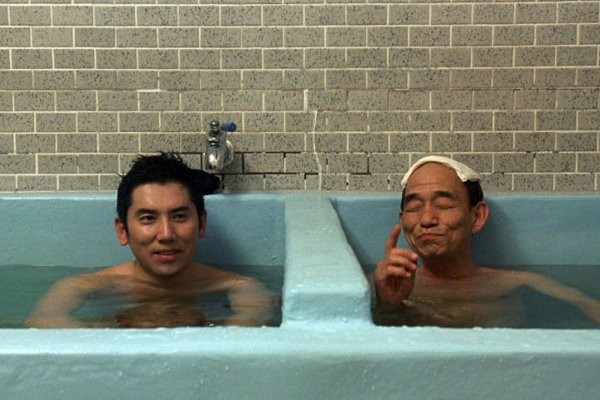
There is definitely room for a nuanced comedy about death, and those who make a living surrounded by it, day in day out. There is also potential in the premise of a man who makes peace with death, and his own life, by working around corpses and the families of the recently deceased. However, this film is a weird mixture of both. Director Yojiro Takita made his name in Japan with a number of "pink films" (a form of adult cinema), including a series called MOLESTER'S TRAIN. This pays off in the opening scene, where two of our main characters hold a dead transvestite's member in utter shock, but when that scene transitions back into melodrama after the punchline, it's less impressive. I'm not saying only Douglas Sirk could've handled this material, but when the first scene of the picture uncomfortably jumps from deep melancholy to high comedy and then immediately back to sadness, you start to question the director's credentials a tad.
The filp-flopping mood of the film, and all the story elements and performances it takes down with it, is a huge part of what sinks this movie. I'm not adverse to the idea of death serving as the principal subject matter for a film, when it's done right. Jim Jarmusch's DEAD MAN and Stephen Frears' THE HIT are two of my favorite movies for the very reason that they linger on what it means to make peace with death, and how it's possible to sully your own attitudes in order to accept the utter inevitability of one's own demise. They are both very funny films, as well, but the humor never gets in the way of what the filmmakers are trying to convey. Perhaps its because the comic moments in that film cry more of bittersweet gallows humor than of broad slapstick (another reason why the subdued, deadpan Ikuei remains charming through the end). DEPARTURES, however, refuses to deal with death other than superficially, and maybe that's its goal: to tell a story about people who are familiar with death without pretending that the job gives them some holy insight on the subject.
But then, what is there? Seriously, this is a 125-minute movie, and I honestly can't tell you what it's about, other than a dude who starts putting people in coffins for a living. He gets over his dad, sure, but all his daddy issues comprise a small fraction of the screentime. There are no less than 5 encoffinment scenes, not including the filming of Ikuei's instructional video. After that first one, which is pretty much wrapped up by the time the title pops up on the screen, we really don't get a lot out of those scenes. Yes, it is a fascinating procedure that I, and many other westerners, would've never heard about or seen had it not been for this film. Yes, there's a grace and beauty to the process of cleaning the body that has a certain unique elegance. Yes, it allows for scenes of sustained sadness while the family grieves silently (and sometimes not so silently) in the presence of our protagonist. But is watching something you've never seen before five whole times enough to make a movie interesting?
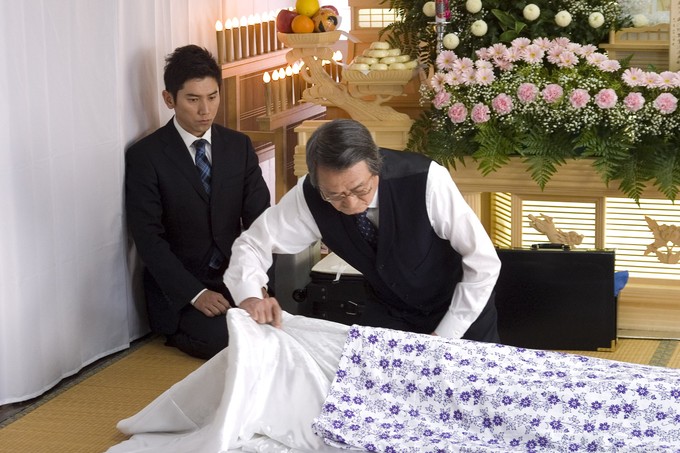
I can't help but think that its this insight into the Japanese encoffinment process (which, in reality, is only done in very conservative, rural areas) that got the film Academy attention. That idea of Orientalism that Edward Said loved to put forward, the notion of eastern Asia as a land of deeply foreign, bizarre practices, rituals and lifestyles. If voters were looking at this film as a sort of National Geographic piece with dramatic underpinnings, I could sort of understand the love that came its way. But as a dramatic, narrative film? This really isn't anything that special. A few pretty shots, some solid human moments here and there, and a lingering, voyeuristic gaze into the encoffinment process do not a good movie make.
It's even crazier when you consider the competition it had that year. In 2009, the other nominees for Best Foreign Language film were THE BAADER MEINHOFF COMPLEX, THE CLASS, REVANCHE, and Ari Folman's WALTZ WITH BASHIR. Roger Ebert, Entertainment Weekly, and Hitfix, all guessed that WALTZ WITH BASHIR or THE CLASS would end up taking the award. But on February 22nd, 2009, the award went to DEPARTURES, the one movie on that roster that I had never heard anything about.
Critics were on both sides of the fence. Ebert, even though he wasn't convinced the film would win Oscar gold, was enamored with the film, and added it to his legendary GREAT MOVIES list, as well at screening it at his annual Ebertfest film festival. "2011 may seem too soon to include a 2009 film in this collection of GREAT MOVIES. I'm including it because having seen it three times I am covinced that DEPARTURES will hold its power and appeal." He calls the screenplay "rock-solid", the cinematography "polite", and claims that the narrative "functions flawlessly." Owen Gleiberman, Andrew Sarris, Variety, and several others echoed Rog's thoughts on the film.
But not the New York Times' A.O. Scott. His review of the film definitely makes me feel less like a crazy person in how closely our opinions towards it match up. "It would be unfair to hold a grudge against Yojiro Takita’s DEPARTURES just because it won the Academy Award this year for best foreign-language film…It is perfeccly mediocre all on its own." Even better: "Life is too short to spend two hours waiting for confirmation of what you already knew and didn't really believe in the first place." And, most to the point, "Overlong, predictable in its plotting and utterly banal in its blending of comic whimsy and melodramatic pathos, DEPARTURES is, in the end, interesting mainly as an index of the Academy’s hopelessly timid and conventional tastes."

A.O.'s snark aside, the fact that this is what was chosen to go down in Oscar history as the Best Foreign Language Film of 2008 really does call the Academy's judgement into question. While I wouldn't go out my way to dump on it outside of discussing its award recognition, this really is not a noteworthy film, not in terms of cinematography, directing, screenplay, or performances (though I did really like Tsutomu Yamazaki's work). I can try and justify the win by trying to picture a comfortably conservative American watching this rituals for the first time, and being utterly fascinated by the process. But I can't imagine even the most awestruck viewer still maintaining interest by the film's fourth or fifth encoffinment without some sort of connection to the characters within the narrative, which I certainly did not have.
So…that's two dud Oscar winners in a row. Hopefully CAVALCADE's a winner.
DEPARTURES is currently available to stream on Netflix Instant
PREVIOUS ENTRIES:
UNDERWORLD (1927): Best Writing (Original Story)
SEARCHING FOR SUGAR MAN (2012): Best Documentary
THE BROADWAY MELODY (1929): Best Picture
THE IRON LADY (2011): Best Actress
THE BIG HOUSE (1930): Best Writing, Best Sound Recording
IN A BETTER WORLD (2010): Best Foreign Language Film
TABU (1931): Best Cinematography
LOGORAMA (2009): Best Short Film (Animated)
BAD GIRL (1931): Best Director, Best Adapted Screenplay
-Vincent Zahedi
”Papa Vinyard”
vincentzahedi@gmail.com
Follow Me On Twitter
